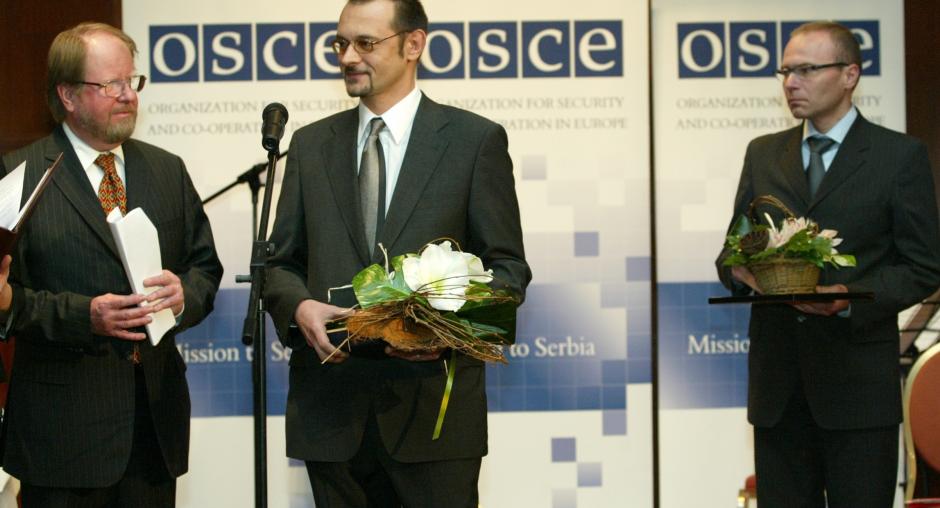Genuine independence is vital, says Serbia's first Provincial Ombudsman
Petar Teofilovic was elected Provincial Ombudsman for the autonomous province of Vojvodina in 2004, becoming the first person in Serbia to hold the post. Since his appointment, Teofilovic has campaigned constantly to protect minority rights and to raise awareness of the ombudsman institution and its services. In 2006, he received the OSCE Mission to Serbia's Person of the Year award in the rule of law and human rights field in honour of his ground-breaking work.
Having headed the office of the Vojvodina Provincial Ombudsman for almost four years now, what are the main lessons you have learned from establishing this institution in Serbia?
Setting up a new institution often involves complex tasks that are not visible to the public but are key to ensuring that it is organized in a competent and efficient manner. From the very beginning, my aim was to structure the Provincial Ombudsman's office in line with parliamentary ombudsman institutions abroad, drawing on their experiences and practices while adapting them to our own regional context. One of the main lessons learned so far is the vital importance of securing genuine independence for the institution, particularly from the executive government and from various lobby groups.
How aware are Serbian citizens of the Ombudsman's role?
The Provincial Ombudsman of Vojvodina was introduced into a setting where the concept of human rights and the supporting institutional system were rather underdeveloped. It was therefore no surprise that citizens generally had vague ideas about the institution, its character, competencies and modes of operation.
In order to raise public awareness, the Provincial Ombudsman has the job of presenting the work of the institution to the general public and to target groups such as women, children, national minorities and other vulnerable groups. The Ombudsman's staff frequently participate in public debates on various human rights issues, which brings further visibility to us and our mission.
Do Serbian citizens trust the Ombudsman institution?
This is an issue that has to be tested over time. In general, my impression is that the level of trust in the Ombudsman institution has increased significantly since it was established, and that this is directly linked to increased awareness of and more accurate information about the institution and its powers.
Your office focuses on preventive action rather than simply reacting to violations. Why is that?
In general, in Serbia there is a need for a systemic approach to the whole set of issues related to human rights advocacy, protection and improvement. Preventive action includes activities such as educational initiatives, seminars, workshops, media campaigns and co-operation with various institutions. These initiatives often require a high degree of commitment and co-ordinated engagement from different institutions. Quantifying the success of this approach, however, is difficult because essentially we would need to count the number of violations that were averted.
How would you comment on the longstanding debate on the Ombudsman's role? Should the Ombudsman act as a human rights defender or be restricted to a watchdog role?
I do not see these two tasks as incompatible. Most forms of maladministration that a watchdog would target result in violations of human rights of individuals or groups. Checking the work of administrative bodies from the point of human rights goes beyond mere control of formal legality and requires the examination of substantive issues. Therefore, I see these functions as complementary and necessary for the effective work of this institution.
One of the strengths of your office is the combination of experienced professionals and young activists on your staff. Can you tell us how you went about setting up your team?
My aim was to build an institution with ambitious, competent and active staff members able to fulfil the various requirements of the job, from working on individual complaints to carrying out projects and workshops, organizing conferences and analyzing legislation. Besides the general staff requirements prescribed by the law, I looked for individuals who spoke at least one foreign language plus at least one of the official minority languages used in Vojvodina, namely Hungarian, Slovak, Romanian or Rusyn. I also sought people who had previous experience in the non-governmental organization sector. My team is diverse in experience, ethnic background and age, which enables staff members to learn from each other, to grow and evolve along with the institution itself.
In December 2006 you received the OSCE Mission to Serbia award as Person of the Year in the rule of law and human rights field. What was your reaction to winning the award?
I was not aware at first that I had even been nominated for the award. When I learned I had won, I was pleasantly surprised, proud and delighted. It was not just a personal honor, but rather a recognition of the competence and quality of the entire Provincial Ombudsman institution. It reflected the efforts that the staff make every day and was a recognition of the institution's accomplishments. The award was an encouragement to everyone in the office. However, it also presented a new challenge because it transformed the standards we have reached to date into the office's new minimum threshold.
How did you use the 2,000 euro prize?
We donated the prize money to Jovan Jovanovic Zmaj high school in Novi Sad for a regional project on tolerance. The Novi Sad school collaborated on the project with an ethnic minority Hungarian high school in Senta in Vojvodina as well as with a high school in Szeged, Hungary.

